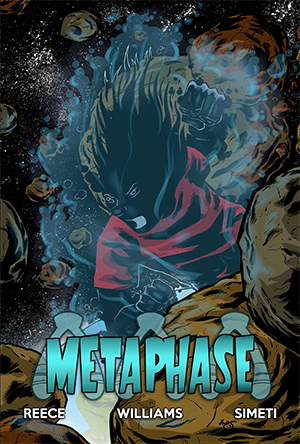Special Son. Super Dad.
Author’s son inspires superhero for graphic novel
BY AMY PHILLIPS

AARON PATTON
Chip Reece’s Metaphase has been featured on NBC Nightly News and People.com. The graphic novel, featuring a superhero with Down syndrome, is available at Amazon.com.
Ollie was small but content, seemingly unfazed by the plethora of equipment needed to keep him stable during his first months on the planet. Each day, his parents stayed by his side at Children’s Mercy Hospital in Kansas City, Mo., knowing they were in danger of losing their jobs back home.
Simply holding their son, with his tangle of tubes, required staff assistance, and they felt helpless at times, but also heartened by the quality of care. And cheered by Ollie, who they believed was communicating that he would be OK.
It would be five months and four surgeries before Ollie could leave the pediatric intensive care unit and travel home.
This is the origin story of an unlikely superhero whose time had come.
Chip Reece ’04 and his wife, Amy (Tagg ’05), knew before Ollie was born that he would require intervention right away. An early ultrasound showed a shortened pinky finger that curved in, a thick fold of skin at the back of his neck, and an atrioventricular canal defect—which, taken together, were likely markers for Down syndrome. Ollie arrived in June 2010, and within three months he had undergone two heart surgeries, the first while weighing just six pounds.
To lessen the stress on Ollie’s small body, doctors performed a tracheotomy and inserted a feeding tube. And to calm his own stress, Reece retreated a couple miles away to a comic book store.
A longtime comic fan, Reece had always fallen into the stories of superheroes as a means of escape. Spider-Man was a geeky kid, as Reece was, and yet he secretly fought off foes, learning his most famous lesson the hard way: With great power also comes great responsibility.
While Reece browsed through the comics, hoping to find a superhero with Down syndrome, he realized the responsibility on his own mortal shoulders.
Disability rarely made a credible appearance in comics at that time. Daredevil is blind, but his senses are heightened to compensate; Professor X needs a wheelchair but enjoys telepathic powers.
“They’re disabled, but not really,” Reece says. “I wanted Ollie to be able to see himself. Here’s a superhero with Down syndrome. I want him to dream as big as anyone else and not be limited by what people think he can do.”
Reece at first brushed off the idea of creating a superhero his son could admire. But after Ollie was life-flighted for a final major heart repair around his first birthday and his health stabilized, Reece had time to think.
He drafted a 10-page teaser and sent it to Kelly Williams, an illustrator he admired. Williams lent his dynamic, stylized approach, and soon their creation caught the eye of Alterna Comics, which offered to act as distributor. A successful Kickstarter campaign would enable Reece to print 1,500 color copies in the summer of 2015.
Metaphase would become the first graphic novel to feature a superhero with Down syndrome.

Metaphase was published by Alterna Comics in 2015 and featured illustrations by Kelly Williams.
In the book, the sinister company Metamakers promises superpowers to the average citizen. By manipulating certain traits, they claim in a television ad, they can “exaggerate abilities, as well as tap into extraordinary abilities.”
The character of Ollie sneaks off with the hope of becoming just like his superhero dad, The Sentinel. Reaching the company’s headquarters, he brags to the receptionist that his extra copy of the 21st chromosome—the defining characteristic of Down syndrome—might just mean he has serious potential.
If Ollie is the first superhero with Down syndrome, then this is the first incident in a graphic novel of disability bias. The receptionist can’t help him, for a reason she won’t specify. Despite that, the superhero refuses to stay tangled in a web of discouragement.
“Ollie is comfortable with having Down syndrome,” Reece says of the character. “He just wants to have powers, help his dad, and be super. Ollie’s power is an extension of his strongest ability, which is his imagination. It’s just like anybody else’s.”
The real Ollie is now 8 years old. His mobility is challenged and he’s still nonverbal, but he’s got a great sense of humor; after performing some small mischief to get a reaction, he’ll laugh when caught. Sitting in the timeout chair, he’ll tap his foot and chuckle.
“He’s a miracle,” Reece says. “I don’t know how it’s possible that he survived. God puts things in place; Ollie comes around and inspires you to do something you never expected you’d do.”
That’s his superpower. 
 Living Your Faith, a summer theology camp hosted by Northwestern, helps prepare high school students to be the next generation of church leaders.
Living Your Faith, a summer theology camp hosted by Northwestern, helps prepare high school students to be the next generation of church leaders. College can be the time of your life. But it should also prepare you for the rest of it.We talked with nine 2018 graduates to see how they’re managing their new “real world” responsibilities.
College can be the time of your life. But it should also prepare you for the rest of it.We talked with nine 2018 graduates to see how they’re managing their new “real world” responsibilities. Looking for a superhero his son could relate to, Chip Reece writes the first graphic novel featuring a character with Down syndrome.
Looking for a superhero his son could relate to, Chip Reece writes the first graphic novel featuring a character with Down syndrome. One day every fall, Raider Nation goes a little bit country when the Student Activities Council presents the Western Hoedown.
One day every fall, Raider Nation goes a little bit country when the Student Activities Council presents the Western Hoedown.
Classic Comments
All comments are moderated and need approval from the moderator before they are posted. Comments that include profanity, or personal attacks, or antisocial behavior such as "spamming" or other inappropriate comments or material will be removed from the site. We will take steps to block users who violate any of our terms of use. You are fully responsible for the content that you post. Comments posted do not reflect the views or values of Northwestern College.